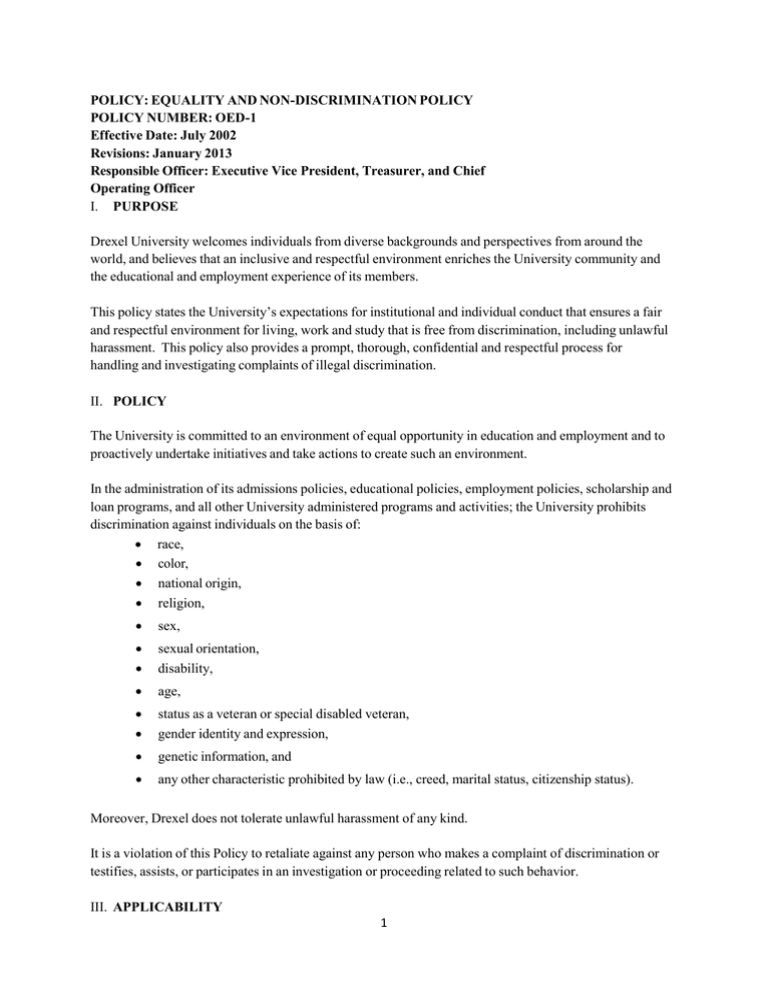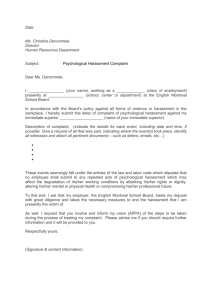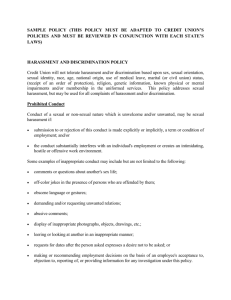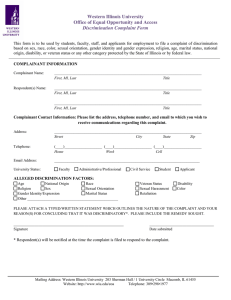
POLICY: EQUALITY AND NON-DISCRIMINATION POLICY
POLICY NUMBER: OED-1
Effective Date: July 2002
Revisions: January 2013
Responsible Officer: Executive Vice President, Treasurer, and Chief
Operating Officer
I. PURPOSE
Drexel University welcomes individuals from diverse backgrounds and perspectives from around the
world, and believes that an inclusive and respectful environment enriches the University community and
the educational and employment experience of its members.
This policy states the University’s expectations for institutional and individual conduct that ensures a fair
and respectful environment for living, work and study that is free from discrimination, including unlawful
harassment. This policy also provides a prompt, thorough, confidential and respectful process for
handling and investigating complaints of illegal discrimination.
II. POLICY
The University is committed to an environment of equal opportunity in education and employment and to
proactively undertake initiatives and take actions to create such an environment.
In the administration of its admissions policies, educational policies, employment policies, scholarship and
loan programs, and all other University administered programs and activities; the University prohibits
discrimination against individuals on the basis of:
• race,
• color,
• national origin,
• religion,
•
sex,
•
•
sexual orientation,
disability,
•
age,
•
•
status as a veteran or special disabled veteran,
gender identity and expression,
•
genetic information, and
•
any other characteristic prohibited by law (i.e., creed, marital status, citizenship status).
Moreover, Drexel does not tolerate unlawful harassment of any kind.
It is a violation of this Policy to retaliate against any person who makes a complaint of discrimination or
testifies, assists, or participates in an investigation or proceeding related to such behavior.
III. APPLICABILITY
1
This Policy applies to the following members of the University Community: trustees, faculty, professional
staff, students, consultants, vendors, service providers, and any other agent of the University who engages
in University activities, business, or transactions.
IV. DEFINITIONS
Complainant: an individual making a complaint.
Respondent: an individual against whom a complaint is made.
Unlawful Harassment: unwelcome physical or verbal conduct based upon race, color, national origin,
religion, sex, sexual orientation, disability, age, status as a veteran or special disabled veteran, or gender
identity and expression, and any other characteristic prohibited by law (i.e., creed, marital status,
citizenship status) that is sufficiently severe, pervasive, and objectively offensive as to substantially
disrupt or undermine a person’s ability to participate in or to receive the benefits, services, or
opportunities of the University.
There are two types of harassment: quid pro quo (Latin term meaning “this for that.”) and hostile
environment. Both types are prohibited.
Sexual Harassment: unwelcome physical or verbal conduct of a sexual nature that can include sexual
advances, requests for sexual favors, and offensive sexual behavior or comments.
Quid Pro Quo Harassment: occurs when an individual explicitly, or implicitly, promises or withholds
job-related or education-related benefits based upon the employee’s or student’s acquiescence to sexual
advances or behavior. Such harassment may involve behavior by a person of either gender against a
person of the same or opposite gender.
Examples of behaviors that may constitute quid pro quo harassment include:
• seeking sexual favors or relationships in return for the promise of a favorable grade or other
academic opportunity;
• basing an employment-related action (e.g., hiring, salary increase, promotion, termination) on
a sexual favor or relationship
• making direct or implied threats that submission to sexual advances will be a condition of
employment, work status, compensation, promotion, grades, or letters of recommendation.
Hostile Environment Harassment: verbal or physical conduct based on race, color, national origin,
religion, sex, sexual orientation, disability, age, status as a veteran or disabled veteran, gender identity or
expression, retaliation, and any other characteristic prohibited by law (i.e., creed, marital status,
citizenship status) that is severe or pervasive enough to create an intimidating, threatening, or abusive
environment.
Examples of behaviors that may constitute hostile environment harassment include, but are not limited to:
• intimidating or hostile acts
• epithet
• slurs
2
•
•
•
unwelcome touching or hugging
denigrating jokes
display or circulation of written or graphic material that denigrates or shows hostility or
aversion toward an individual or group.
V. PROCEDURES
A. Reporting Obligations
All members of the University community should report incidents of discrimination or harassment to the
Office of Equality & Diversity (“OED”), (215) 895-1405.
Reports may also be made through the University’s confidential Whistleblower Hotline at 866-358-1010
(toll free) or through the following website:
https://secure.ethicspoint.com/domain/en/report_custom.asp?clientid=14030.
All officers, deans, department heads, faculty members, academic advisors, directors, and supervisors
must report any and all incidents of discrimination and harassment to the OED whether they have
knowledge of or have witnessed directly such discrimination or harassment. These individuals must refer
the complainant to OED and then report to OED that a referral has been made.
All individuals who believe they have been discriminated against or harassed should file a written
complaint with the OED.
B. Complaints
1. Filing a Complaint
Before filing a complaint, individuals are encouraged to utilize one or more of the methods set forth under
Managing Complaints of Discrimination or Harassment, Informal Resolutions (see below) to attempt to
resolve allegations of discrimination or harassment.
If a party chooses to file a complaint, the complaint must be in writing, signed by the complainant, and
filed with the OED within 30 days of the alleged discrimination or harassment. On the complaint form,
the complainant can provide names of witnesses and identify any evidence to support the complaint.
The Complaint of Discrimination or Harassment form can be found on the OED website
(www.drexel.edu/oed) or in the Office of Equality & Diversity (located at the Intercultural Center, 30
South 33rd Street, Philadelphia, PA 19104).
2. Managing Complaints of Discrimination or Harassment
Complaints of discrimination or harassment may be resolved through either the informal or formal
processes described below.
In cases in which the matter clearly falls outside the purview of this Equality and Non-Discrimination
Policy, OED shall make the appropriate referrals.
3
Although none of the actions set forth below are required before an individual may file a complaint, the
University encourages use of these methods for informal resolutions of allegations of discrimination or
harassment. This list is not exhaustive.
A. Informal Resolutions
The OED may manage the complaint informally, with the agreement of the complainant, through
the use of any of the methods detailed below.
Should the following informal methods fail to resolve the matter satisfactorily, a complaint may
be filed as outlined below under “Formal Process – Complaint Investigation.”
1. One-On-One Meeting. The complaining party, either alone or with another person, may
choose to meet with the individual whose behavior is offensive, discuss the situation, and
make it clear that the behavior is unwanted and must cease.
2. Intervention by Supervisor. The complaining party may contact an individual with
supervisory authority and request assistance to stop the behavior.
3. Facilitated Conversation or Mediation. A complainant may contact the OED and request
the assistance of a facilitator or mediator to attempt to reach a resolution.
Achievement of Resolution
The informal resolution process outlined above shall extend no longer than 45 business days after
the allegation is made. Resolution of the complaint is the expected outcome of the informal
process. Resolution may include, but is not limited to:
1. an agreement to terminate and not repeat specific conduct;
2. an apology and/or participation in education, training, or counseling,
3. withdrawal of the allegation without the right to reassert it.
Where appropriate, the OED shall review resolutions, including any Performance Improvement
Plan, to ensure that the parties fully understand the terms.
Resolution need not imply an admission of culpability.
All resolutions must be agreed to and signed by both parties. Resolutions are binding and a
formal complaint may not be filed later on the same set of circumstances. However, any conduct
admitted by the respondent as part of the resolution may be considered in any future
discrimination or harassment investigation. Any breach of the terms of an informal resolution
agreement may result in disciplinary action or a further claim of discrimination or harassment.
B. Formal Process – Complaint Investigation
If the informal process for resolution of a complaint of discrimination or harassment is not
successful or, in the discretion of the OED is not warranted, the OED shall conduct a prompt, fair,
and thorough investigation of the allegations in the complaint.
In some cases, the alleged conduct specified in the complaint may be such that to protect the
4
complainant or other members of the University community, the University may, in its discretion,
promptly elect to place the alleged offender on administrative leave with or without pay, may
implement a temporary reassignment, or may implement other interim remedial measures. These
interim remedial measures will generally remain in effect for the duration of the complaint
investigation process.
All University students, faculty, and professional staff will be required to cooperate fully with the
OED in the investigation and resolution of complaints under this Policy.
1) Determinations
The outcome of the investigation may be a finding that the allegations are unwarranted or
could not be substantiated; a negotiated settlement; or a finding that the allegations have
been substantiated. If the allegations have been substantiated, recommendations for
disciplinary or other action will be forwarded to the appropriate University officials.
The University will take all necessary steps to prevent the recurrence of any
discrimination or harassment and will correct its discriminatory effects on the
complainant and others, if appropriate.
The standard of proof for administrative proceedings is that of a "preponderance of
evidence" - that is, evidence which, as a whole, shows that the fact sought to be proved is
more probable than not.
Within 60 days of the filing of a complaint or from the date of the decision to pursue the
formal process for resolution of a complaint, the Associate Vice President of Equality &
Diversity will communicate the final disposition of the complaint to the Complainant, the
Respondent and the appropriate University officials. (Depending on the complexity of the
matter, the investigation may not be able to be completed within 60 days of the filing of
the complaint but will be completed within a reasonable period of time.)
The responsibility for imposing disciplinary action will rest with the senior University
official with management responsibility for the Respondent or with Student Conduct and
Community Standards if the Respondent is a student.
2) Appealing a Determination
Either the Complainant or Respondent may file an appeal of any decision concerning
the resolution of the complaint. An appeal by either party must be made, in writing, to
the Executive Vice President, Treasurer, and Chief Operating Officer within 10 days
of receipt of the notice of the resolution or disciplinary decision.
The written appeal must state, in detail, the reason(s) for the appeal and shall address one
or more of the following:
a) If the appeal alleges that the findings of the Investigator included relevant factual
5
errors or omitted relevant facts, the appeal shall specify each factual error and/or
details of each relevant fact that was omitted from the investigation.
b) If the appeal alleges substantive procedural errors, the person appealing shall identify
each instance of said substantive procedural error.
c) If the appeal alleges relevant or substantive issues or questions concerning
interpretation of University policy, the person appealing shall state, in detail, the
issues or questions supporting this allegation.
d) If the appeal alleges that new information or evidence exists, the appeal shall specify
the reason why this information was not available or not provided to the Investigator
during the course of the investigation, including the reason why the information
could not have been provided on a timely basis.
e) If the appeal alleges either that action or inaction of the supervisor in response to the
findings of the investigation will not prevent future violations of this Policy, the
person appealing will specify, in detail, the reason(s) and basis for this allegation.
The Executive Vice President, Treasurer, and Chief Operating Officer shall review the
appeal and issue a decision within thirty (30) days of receipt. This decision is final and no
further internal appeals are available with the University.
No disciplinary or other action based upon the original complaint findings shall be taken against
the alleged offender during the appeals process, although temporary, interim measures may
remain in place as provided in this Policy.
C. Retaliation
Any employee, faculty member or student who retaliates against an individual who complains of,
witnesses, or participates in an investigation or resolution of a complaint of discrimination or
harassment violates University policy and will be subject to disciplinary action, up to and
including termination or dismissal.
Complaints of retaliation should be reported as violations of this Policy.
D. Confidentiality
Although the University is committed to respecting the confidentiality and privacy of all parties
involved in the reporting and resolution of discrimination and harassment complaints, it cannot
guarantee complete confidentiality. Examples of situations in which confidentiality cannot be
maintained include:
• when the University is required by law to disclose information (such as in response to legal
process),
• when disclosure of information is determined by OED to be necessary for conducting an
effective investigation of the claim, and
6
•
when confidentiality concerns are outweighed by the University’s interest in protecting the
safety and rights of others and its duty to investigate.
RELATED POLICIES
• OED-2 Reasonable Accommodation of Individuals with Disabilities
7





